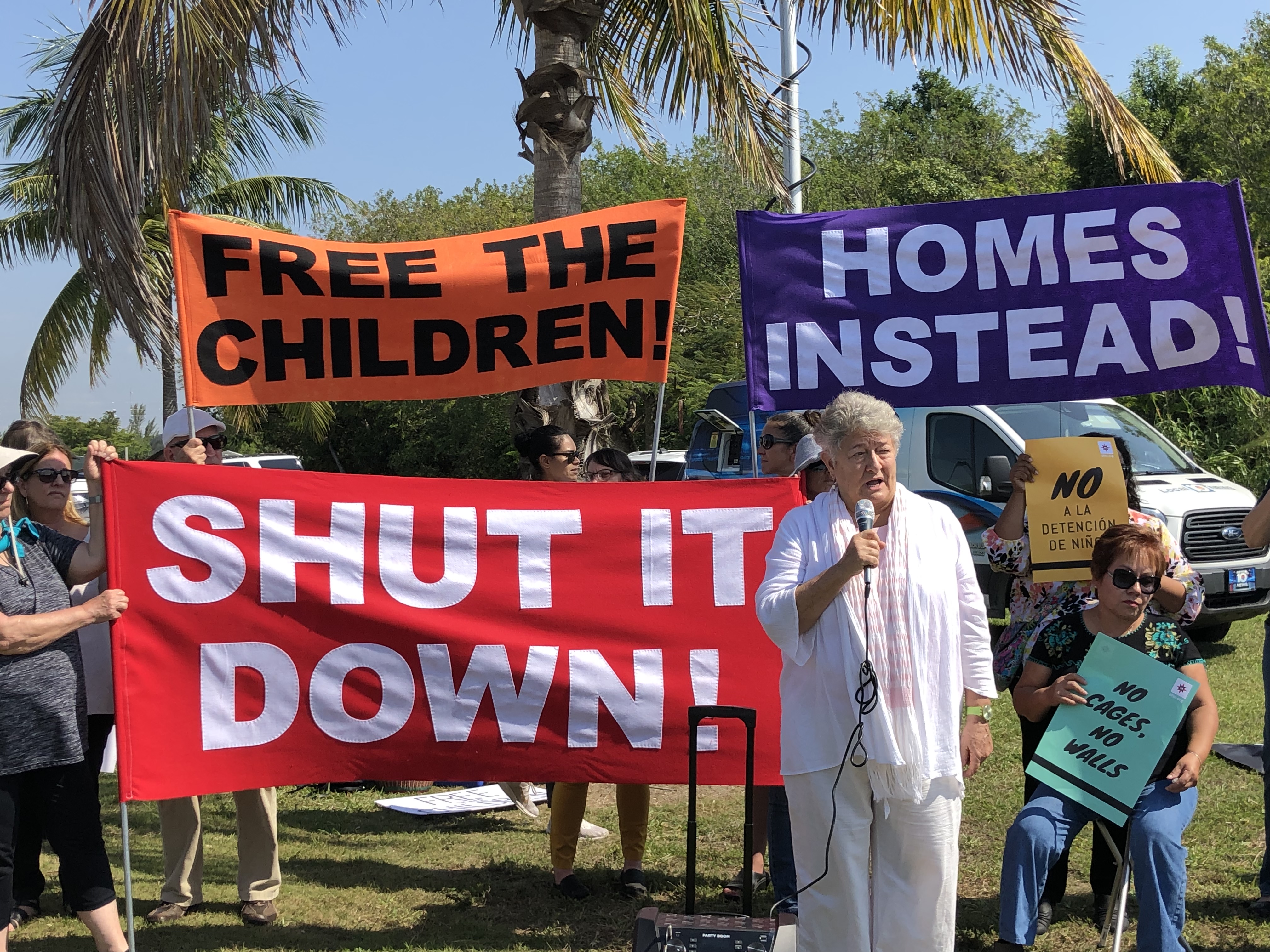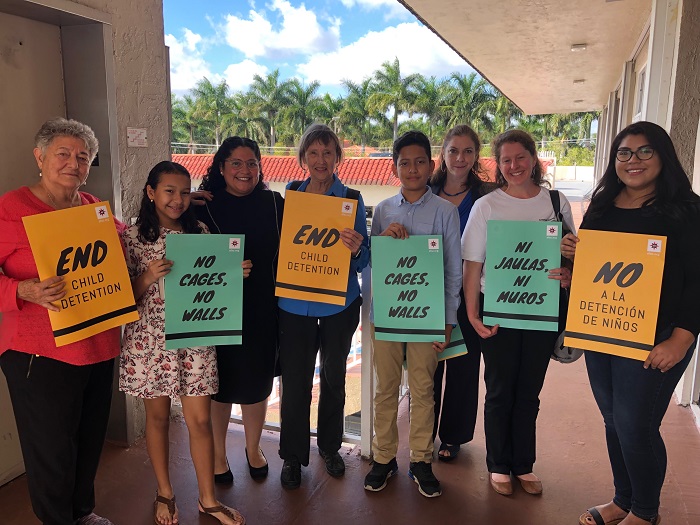
Sign the petition to stop immigrant child detention today and help us get 100,000 signatures!
As I stood across the street from the Homestead detention center for immigrant children, I tried to imagine what it must be like for the Central American teenagers incarcerated in this “temporary” shelter on federal land near Miami. Very few visitors have been allowed inside, and fewer still have been able to talk directly with the children, ages 13 to 17. The private corporation that runs the detention center, the for-profit Caliburn International says it must protect the children’s right to privacy. But what about their right to be reunited with their families?
Caliburn has allowed a few members of Congress in after much persistence on their part. A few reporters have been allowed a “tour,” but none has been able to interview the children in detention. They are shown the rows of bunk beds, the lunch lines, the “classes,” and the soccer games outdoors, which give the impression of a highly controlled summer camp. Except these kids can’t go home. They don’t even know where home is anymore.
Some have been held for six months, waiting to be reconnected with their families. Those of us on the outside can only speculate about what they are experiencing, the traumas they must be dealing with, the anxiety of not knowing whether they will ever see their parents again, the fear of being sent on to prison when they turn 18, the feelings of unworthiness associated with being behind bars, of wondering why they are prisoners.
What did they do wrong? They fled systemic violence and terror in their home countries. Some made the treacherous journey alone, on foot, by bus and rail through Mexico. Others came with relatives but were separated from them at the U.S.-Mexican border and were sent to centers where they are classified as “unaccompanied minors,” because the adults who came with them were not their actual parents. Maybe the person they came with was an uncle, an older cousin, a grandparent. But to Immigration and Customs Enforcement (ICE), that didn’t matter.
When the Trump administration began taking children from their parents at the border crossings, the action was intended to dissuade refugees from coming. Public outrage forced a change in that brutal policy. But the victims of that policy live on in Caliburn’s for-profit Homestead facility, which is making $730 dollars a day per child. Business is so good, they are increasing their capacity by another 1,000 beds, enabling Caliburn to house 2,600 children.

Instead of being released to family members or other sponsors, many are spending weeks or months in inhumane detention. And because Homestead is an “emergency influx center,” children are not protected by agreements that ordinarily ensure licensing and other standards are met.
Basically, the federal government doesn’t know what to do with these children. If they haven’t been deported, or released to sponsors, they languish in the camp. According to local grassroots immigrant advocacy organizations, there are people -- often extended family members -- who want to sponsor the children. But many are undocumented themselves. To step forward and undergo background checks in order to become sponsors, they would risk almost certain arrest by ICE and deportation, losing all they have worked for to make a secure life for their families in the U.S.
The rules regarding the release of children even to close relatives with legal residency are strict. I know of one case of an aunt who was told her niece was ready to be released to her custody. She flew down from Baltimore but returned without her niece because she didn’t have a set of fingerprints from her husband. She had not been advised in advance that she would need them. But the officials said they had to have his fingerprints on file since he would be living in the same house as the girl. Not only was she turned away, she could only see her niece through thick glass. No hugs, no wiping away the tears from her face, no holding of hands. She was only able to shout through the glass and assure her hysterical niece that she would be back to get her out.
As a mother, an aunt, a human being, I can imagine how cold that glass must have felt between despair and comfort, how painful to look into the crying eyes of a young girl desperate to be with her family. This is only one horror story of tens of thousands.
As a Quaker, I try to be guided by an inner Light that tells me that keeping refugee children in jail is an affront to the entire human race. And for immense profit.
The American Friends Service Committee accepted the Nobel Peace Prize in 1947 on behalf of Quakers worldwide for coming to the aid of refugees after the devastation of World War II. Once again, AFSC is taking up the cause of tens of thousands of Central American refugee families fleeing the terror of violence, brutality, and hunger, amassing in encampments on the U.S.-Mexican border, waiting to enter legally and to exercise their international right to seek asylum.
Miami Quakers stand with AFSC and local immigrant advocacy groups calling for the shutdown of this prison for refugee children. Until it is closed and the children have been reunited with family, we will continue to raise our combined voices to demand humane immigration policies that reflect the foundational values of our nation.